#hisako tanaka
Text

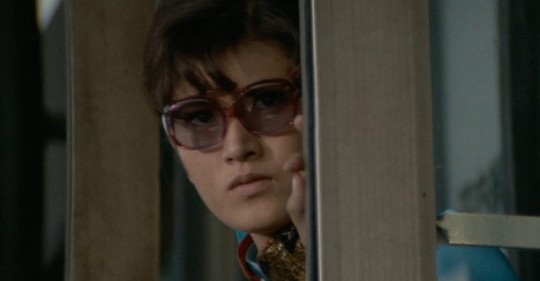
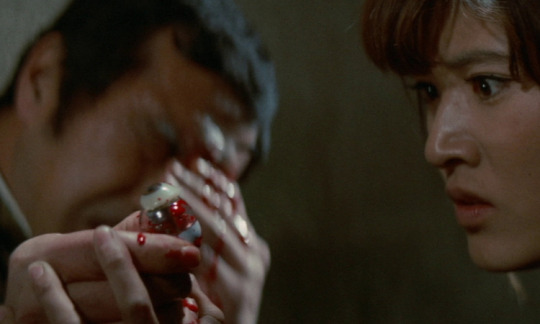
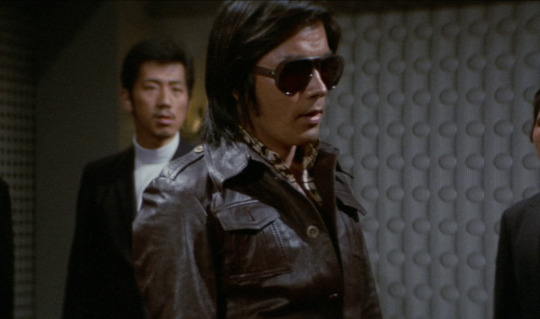
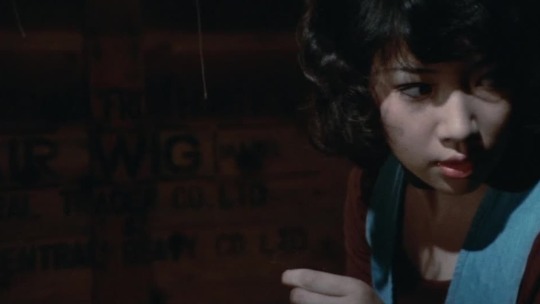


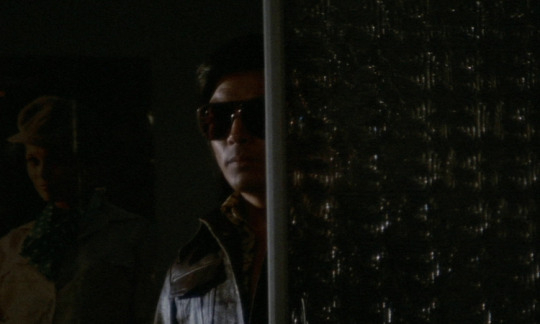

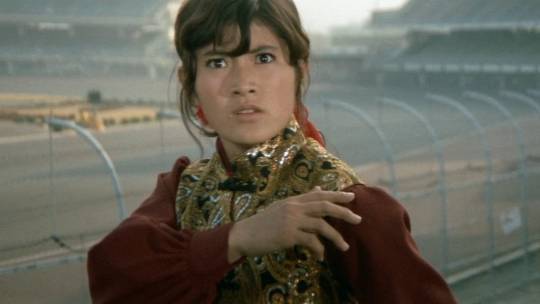
Onna hissatsu ken: Kiki ippatsu (Sister Street Fighter: Hanging by a Thread, 1974)
"What amazing sisterly love. Ha ha ha! I'll be sure to send Koryu to the afterworld in a manner even more cruel."
"You kill innocent people like they're insects. It's inhuman!"
#Onna hissatsu ken: Kiki ippatsu#Sister Street Fighter: Hanging by a Thread#street fightin' cinema#japanese cinema#blood tw#eye trauma#(it's a fake eye anyway it's cool) (like within the film it is also a fake eye)#kazuhiko yamaguchi#masahiro kakefuda#norifumi suzuki#etsuko shihomi#tamayo mitsukawa#michiyo bandô#hideo murota#hisako tanaka#kôji fujiyama#takashi hio#taiko rin#masashi ishibashi#kazuyuki saito#osamu kaneda#shunsuke kikuchi#aww yeeeh she's back! breaking bones and smashing faces! a virtual retread of the first SSF film‚ with Shihomi once again investigating a#smuggling operation in Japan‚ facing familial betrayal‚ bizarro martial arts masters and the incomparable Ishibashi as chief henchman#it's becoming a familiar formula but im not complaining‚ these films are just fun ok. i did miss Chiba a little this time around but at the#same time I think it's only fair that Shihomi get full lead status and his presence tended to detract from that a little in the previous#entry. there's a racecourse set fight in this one which does fascinating things with a concrete brutalist setting (very much at odds with#the busy streets or natural beaches of the first film's major showdowns). highly enjoyable hokum and Shihomi still kicking it out of the#park (and directly into a goon's face) as the titular badass with a heart of gold and fists of pure justice
9 notes
·
View notes
Photo
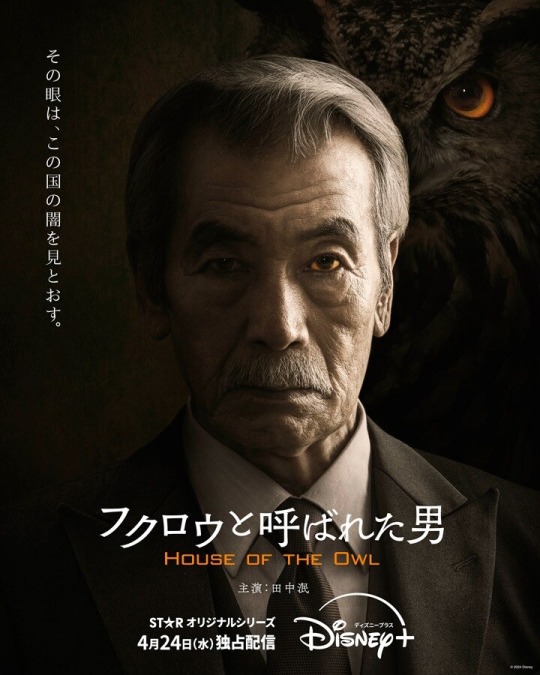
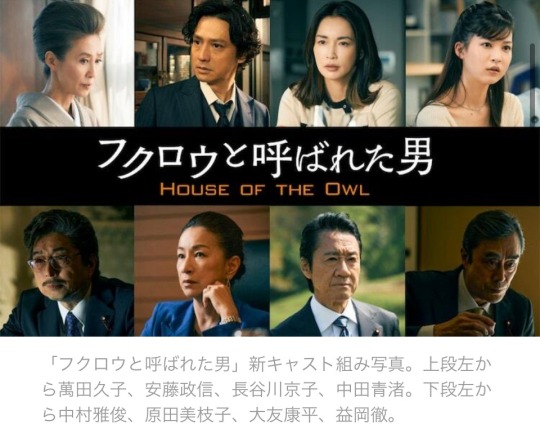
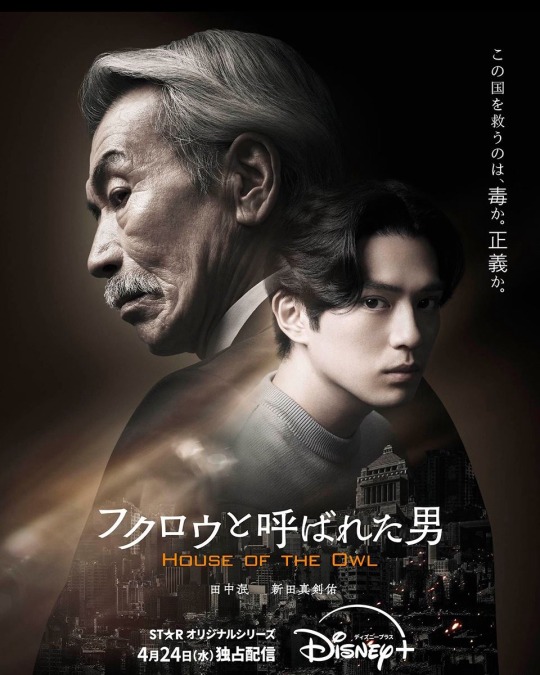
Mackenyu Arata (who became an internationally popular actor for his roles as the main character in the live-action "Knights of the Zodiac(Saint Seiya)The Beginning" movie and ZORO in the live-action "One Piece") and Min Tanaka star in this serious drama series “House of the Owl”about a Japanese, hidden political and financial mastermind known as the "Owl". https://x.com/takigawa_w/status/1790365255169904916?s=46&t=8Vf8aUwk_B-ZbQ5UAGv05w The owl sees everything with eyes that can see anytime, even in the middle of the night. Seventy-year-old charismatic Ryutaro Ohgami (Min Tanaka) has four children. His eldest son, Ichiro (Masanobu Ando), is unreliable, does not get along with his wife, has a Ginza hostess as his mistress, and is planning a new luxury restaurant without borrowing funds from his father so that he can leave his father's influence. Yumiko (Kyoko Hasegawa), the firm eldest daughter, has two seemingly happy children with her handsome trading company man husband, but her husband is doing shady deals (of a different kind than an interpreter for famous Major-League players) behind her back. The second son, Ryu (Mackenyu Arata), does not get along with his father, and after studying in the U.S., he returns to Japan to work for a small non-profit organization without contacting his family. One day, Ryu bumps into a beautiful American woman while jogging in the park, and her phone falls into the street and breaks. Ryu promises to pay for it, and when he asks for the woman's contact information, she gives Ryu her business card, which says "reporter" on it. Risako (Nakata Seina), the youngest and second daughter, aspires to be a singer-songwriter and is already 25 years old, but she has a natural singing voice and talent for songwriting and is expected to make a major debut. Risako tells her father, Ryutaro, about her dream, but Ryutaro is afraid that Risako will be swallowed up by the darkness of the entertainment world. One night, the son of Takeuchi (Masatoshi Nakamura), a candidate for the next prime minister, is killed after a bar fight. The son was also suspected of being on drugs. The murder suspect is caught, but "commits suicide" in jail. Overall, the story has a cool taste and a serious development. A scandal involving a politician, Ichiro's mistress, Yumiko's husband's ruinous dealings, Ryu starting a relationship with a beautiful reporter, Risako going for her dream, and their lives are vividly depicted. Hisako Manda's restrained performance as Ryutaro's wife, Kyoko, shines. The show's portrayal of the Tokyo club (the one with hostesses)scene, with Tae Kimura's performance as a hostess, adds a touch of realism that makes the show feel all the more authentic. Tae Kimura's performance as the hostess Ryutaro values as a source of information has a realistic feel as if she actually works at a club in Tokyo. What sets "House of the Owl" apart from other Japanese TV drama series is its serious, captivating depiction of the family's struggles, without resorting to over-the-top acting or exaggerated music. There is none of the over-the-top music, over-the-top acting, or over-the-top (unintelligible) jokes that are common in Japanese dramas, nor are there any male celebrities from famous entertainment companies that have caused scandals in Japan, nor any female casts from dozens of female idol group members performing not-so-good songs and dances. Thus, we can calmly observe the whereabouts of this charismatic, mastermind owl, Ryutaro Oogami, and his family. And just as real owls have natural enemies, those who are after "owls" are also heavily represented. If you have watched the episodes carefully, you may be shocked by the series of events that occur in the latter half of the season. The series culminates in a shocking series of events that will leave you eagerly anticipating the next season. This is a must-watch for anyone looking for a drama that offers a glimpse into the complex lives of a family caught up in the world of politics and finance. I can't wait for the second season. #HouseOfTheOwl
#hoto#owl#フクロウ#黒幕#デビッドシン#中���青渚#原田美枝子#池田良#中村雅俊#安藤政信#萬田久子#長谷川京子#田中泯#真剣佑#新田真剣佑#フクロウと呼ばれた男#houseofowl#mackenyu#mintanaka#mackenyuarata#davidshin#kuromaru#大友康平#木村多江#長塚京三
8 notes
·
View notes
Text
Death end re;Quest Code Z first details, screenshots
From Gematsu

Compile Heart has released the first information and screenshots for roguelike RPG Death end re;Quest Code Z, which is due out for PlayStation 5, PlayStation 4, and Switch on September 19 in Japan.
Get the details below.
[Violence/Gore warning; they weren't kidding with that CERO Z rating]
■ Story
A story in which various “parallel worlds” exist.
Iris was born in “DE-1 World,” which is the spitting image of Earth in the 2000s. The “spiral” of tragedy that continues to loop created by Iris’ birth is gradually unraveling thanks to the activities of Arata Mizunashi and company.
And so Iris, who regained good will, created “DE-1.5 World,” a replica of “DE-1 World.” This was an ideal world where those expected to fight were kind to one another, and where everything was in sync. However, a new crisis drew near even in this world.
A mysterious man appears, and the heroines are in danger. And so new protagonist Sayaka Hiwatari must face against a chaotic scene of friends and foes alike.
The battle against the upper world is about to enter a new phase…


■ Key Features
Significantly More Gruesome Expressions in the Series’ First CERO Z-Rated Entry
Death end re;Quest Code Z is loaded with event scenes that vividly depict the characters in bloodshed and after death. Additionally, intense sound effects significantly enhance the game’s sense of realism, which includes bones breaking, flesh tearing, and necks twisting.

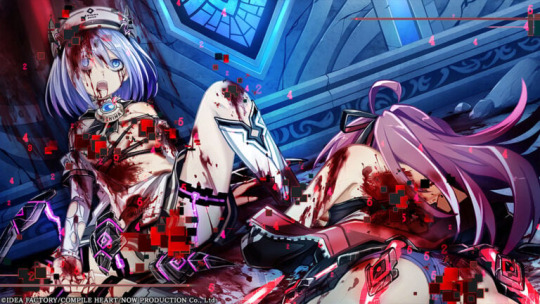
A Completely New Story Featuring a Cast of All-Stars
Featuring numerous popular returning characters from previous entries as well as new characters, Death end re;Quest Code Z is a new story connected to past titles. The player teams up with the cheerful and positive new protagonist Sayaka Hiwatari, and the story advances as they work together. Unravel the inner workings of the world and approach the mastermind.
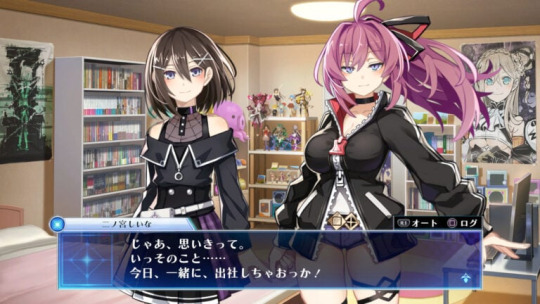


A Roguelike RPG That Can Be Played Again and Again
The alternate dimension known as the “Strain Area” is a 3D dungeon that changes structure each time you enter. With terrain, enemies, traps, and items that change upon every entry, unexpected “deaths” await!
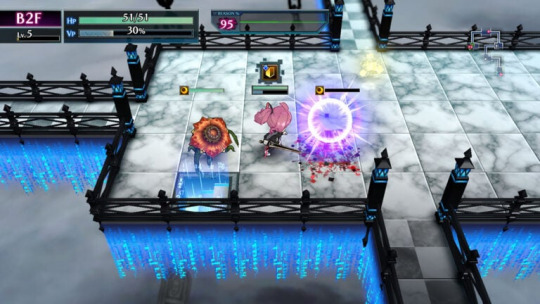
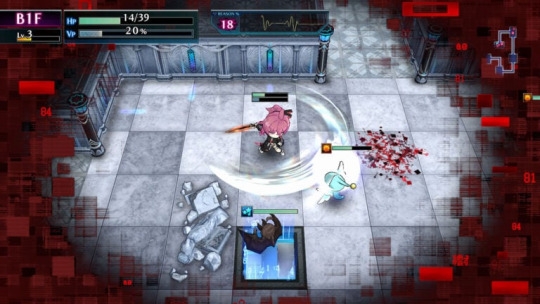
■ Characters
Iris
Sayaka Hiwatari (voiced by Yoshino Aoyama)
Shina Ninomiya (voiced by Hisako Tojo)
Mai Toyama (voiced by Chiwa Saitou)
Yurisa Yamamura (voiced by Yuuki Kuwahara)
Order of Aphasis
Liliana Pinnata (voiced by Manaka Iwami)
Artists / Celebrities
Kaede Hizumi (voiced by Marika Kouno)
Chloe Aaron (voiced by Chiyo Tomaru)
Svetlana Amou (voiced by Chinami Hashimoto)
Chosen Citizens
Hinata Morikubo (voiced by Minami Tanaka)
Unknown
Rotten Dollhart (voiced by Madoka Asahina)
■ Theme Songs
Opening Theme Song
Title: “Over my DEAD copy”
Singer: Gesshoku Kaigi
Writer / Composer / Arrangement: Gesshoku Kaigi
Ending Theme Song
Title: “Zion”
Singer: Gesshoku Kaigi
Writer / Composer / Arrangement: Gesshoku Kaigi
View the screenshots at the gallery. Visit the official website here.
#Death end re;Quest Code Z#Death end re;Quest#Compile Heart#Roguelike#RPG#Gematsu#...I think I may prefer the text descriptions over this because holy crap. They're really taking advantage of that Cero Z rating.#Feels like a step below those ero-guro VNs that I can't really stomach.#Please let the readmore work.
7 notes
·
View notes
Photo
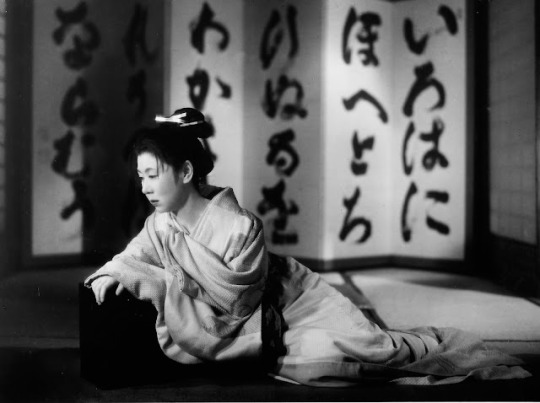
Kinuyo Tanaka in The Life of Oharu (Kenji Mizoguchi, 1952)
Cast: Kinuyo Tanaka, Tsukie Matsuura, Ichiro Sugai, Toshiro Mifune, Toshiaki Konoe, Kiyoko Tsuji, Hisako Yamane, Jukichi Uno, Eitaro Shindo, Akira Oizumi, Kyoko Kusajima, Masao Shimizu, Daisuke Kato. Screenplay: Kenji Mizoguchi, Yoshikata Yoda, based on a novel by Saikaku Ihara. Cinematography: Yoshimi Hirano. Production design: Hiroshi Mizutani. Film editing: Toshio Goto. Music: Ichiro Saito.
Oharu (Kinuyo Tanaka) is by turns a lover, a concubine, a courtesan, a servant, a wife, a prostitute, and a nun, which in the 17th-century Japan of Kenji Mizoguchi's film is almost everything a woman could possibly be. But Tanaka's great performance individualizes Ohara, keeping her from just being a representative figure, a stand-in for Woman. Over the course of the film, Oharu suffers almost every indignity that could be inflicted on her: At the court in Kyoto where she is a lady in waiting, she falls in love with a page, Katsunosuke (Toshiro Mifune), but when their affair is discovered, she and her parents are expelled and he is beheaded. One day a courtier for a powerful feudal lord comes to the village where they are exiled: The lord is in need of an heir, and his wife is barren. Oharu fits his rather exacting specifications to the letter, so she is brought to his palace where she bears him a son, but she's not allowed to nurse the child and is expelled from the household by his jealous wife. She goes to work as a courtesan to pay off the debts incurred by her greedy father (Ichiro Sugai), takes a job as maid to a woman who suspects her of sleeping with her husband, marries a man who is killed by robbers, and becomes a Buddhist nun but is expelled from the temple for supposedly seducing a man who was actually trying to rape her. Years pass and she loses her beauty and now walks the streets to earn money to survive, but she is subjected to scorn and mockery as a "goblin cat" by a man leading a group of young pilgrims. Hope dawns when she is summoned to meet her son, who has succeeded his father as lord, but it turns out that the officials in the court really want to cover up the fact that their lord's mother has been a prostitute, so she runs away after only a brief and distant glimpse of him. At the end she wanders the streets as an itinerant nun receiving alms in exchange for prayers -- her prostitution is now spiritual rather than physical. It's easy to take a synopsis like this and dismiss the story as "lachrymose as a soap opera," and "a reverse Horatio Alger adventure," as a particularly obtuse New York Times review did when The Life of Oharu was first released in the United States in 1964. It is neither of those things, of course. Even the Times reviewer was struck by Tanaka's performance, Mizoguchi's direction, and Yoshimi Hirano's cinematography, without understanding how or why these elevate the story into art. The story comes from a 17th-century novel by Saikaku Ihara, The Life of an Amorous Woman, a work far more erotic and picaresque than the melancholy screenplay Mizoguchi and co-screenwriter Yoshikata Yoda derived from it. The Life of Oharu is unremittingly grim -- it put me in mind of the novels of Thomas Hardy, whose characters suffer more than seems absolutely necessary for the author to make his point about the workings of fate. But the film is not about suffering; it's about strength, and women's strength in particular.
8 notes
·
View notes
Text
The Moon Has Risen
「月は上りぬ 」田中絹代
Directed by Kinuyo Tanaka • 1955 • Japan
Starring Chishu Ryu, Shuji Sano, Hisako Yamane

主題
奈良で暮らす三姉妹が、嫁いでいく物語
お前、俺のこと好きか?
ーー好き
大好きか?
ーー大好き
小津安二郎は、これを本当に書いたのか?節子と昌二が喧嘩をするシーンで、ドラマチックな曲が無理やりのように挿入される。ドラマを無理やり作ろうとするクローズアップが見ていて、痛々しい。
節子役の北原美枝(石原裕次郎の妻)の演技も、厳しい。もう少し、余裕を持って演じさせた方が、物語に深みが出ると思うが、そんな余裕は、田中監督にはなかったのかもしれない。小津が本を書けば、どうしても、小津と比べてしまうので、それはそれで、プレッシャーだったのかもしれない。
2021年にこれがカンヌで上映されたようだが、最後の昌二の強引なセリフなどは、現代の西洋人に理解できるのだろうか。。。今の日本人でもきついのでは。。。
0 notes
Text
Muen shakai no sōgi to haka
New item:

Shelf: 385.6 MUE
Muen shakai no sōgi to haka : shisha to no kako genzai mirai.
edited by Yamada Shin'ya, Doi Hiroshi.
Tōkyō : Yoshikawa Kōbunkan, 2022.
ISBN: 9784642082068
245 pages : illustrations ; 22 cm.
Articles in this book are based on presentations at a conference "Shisha to Seija no Kyōdōsei--Sōsō Bosei no Saikōchiku o mezashite" held on December 15-16, 2018 at Waseda Daigaku. Some articles are revised with the latest research results.
Includes bibliographical references at end of each chapter.
Text in Japanese.
Table of contents:
"Aratana shi no kyōdōsei / Kotani Midori.
Dejitaru jidai no tomuraikata / Uryū Daisuke.
Hikitorite no nai kojin no sōsō to josō seido / Yamada Shin'ya.
Jinkō idō to sōgi gojo shisutemu no keisei : Yamagata-ken Mogami-machi no keiyakukō o jirei ni / Ōba Aya.
Ihai bohyō to sōsō / Tanigawa Akio.
Ryōbosei no shūen to dentō no goji / Kutsuki Ryō.
Kaisō seido no shiteki tenkai : "hakajimai" ni itaru made / Mori Kenji.
Kindai kōkyō bochi no seiritsu to hensen : Ōsaka no toshishi to shite no bochi / Makimura Hisako.
Shōwa shoki no "eidai kuyōbo" kōsō : Tanaka Chigaku to Hosono Ungai / Suzuki Iwayumi.
Kibō wa, nōkotsudō : Shōwa senzenki ni okeru haka no shōrai kōsō / Doi Hiroshi.
Ie-baka to ie-baka hihan no rekishi shakaigaku : karōto no fukyū o megutte / Toishiba Shibo.
0 notes
Photo


The Great Chase
55 notes
·
View notes
Photo

月刊シナリオ 1973年8月号
シナリオ作家協会
表紙モデル=田中久子
「樺太一九四五年夏 氷雪の門」国弘威雄、日活ロマンポルノ「女地獄森は濡れた」神代辰巳、毎日放送サスペンスドラマ「怪談整形美女」白坂依志夫、オート・スライド台本「松竹の沿革」大谷信義
18 notes
·
View notes
Photo

The Moon Has Risen (Tsuki wa noborinu), Kinuyo Tanaka (1955)
#Kinuyo Tanaka#Yasujirô Ozu#Ryôsuke Saitô#Chishû Ryû#Shûji Sano#Hisako Yamane#Yôko Sugi#Mie Kitahara#Kô Mishima#Shôji Yasui#Shigeyoshi Mine#Takanobu Saitô#Mitsuo Kondô#1955#woman director
39 notes
·
View notes
Photo
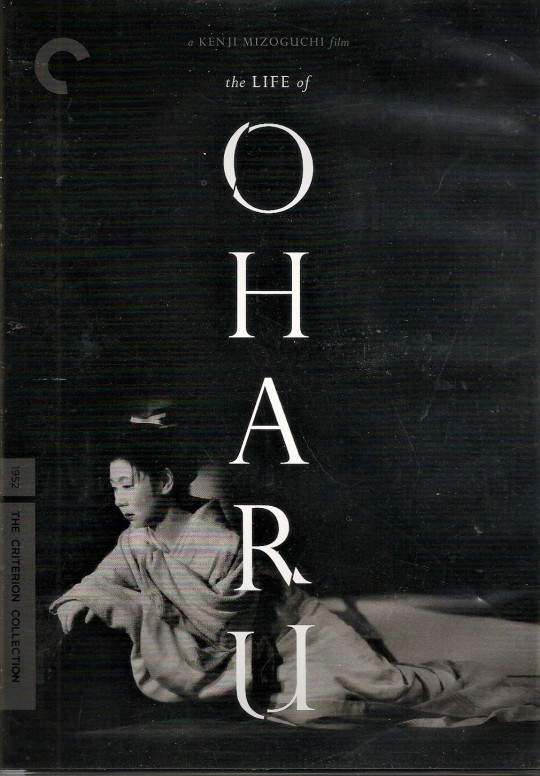
Bad movie I have The Life of Oharu 1952
#The Life of Oharu#Koi Productions#Kinuyo Tanaka#Tsukie Matsuura#Ichirô Sugai#Toshirô Mifune#Toshiaki Konoe#Kiyoko Tsuji#Hisako Yamane#Jûkichi Uno#Eitarô Shindô#Akira Ôizumi#Kyôko Kusajima#Masao Shimizu#Daisuke Katô#Toranosuke Ogawa#Hiroshi Oizumi#Haruyo Ichikawa#Hiroshi Mizuno#Yuriko Hamada#Noriko Sengoku#Sadako Sawamura#Masao Mishima#Eijirô Yanagi#Chieko Higashiyama#Takashi Shimura#Benkei Shiganoya
8 notes
·
View notes
Quote
Mackenyu Arata (who became an internationally popular actor for his roles as the main character in the live-action "Knights of the Zodiac(Saint Seiya)The Beginning" movie and ZORO in the live-action "One Piece") and Min Tanaka star in this serious drama series about a Japanese, hidden political and financial mastermind known as the "Owl".
The owl sees everything with eyes that can see anytime, even in the middle of the night.
Seventy-year-old charismatic Ryutaro Ohgami (Min Tanaka) has four children. His eldest son, Ichiro (Masanobu Ando), is unreliable, does not get along with his wife, has a Ginza hostess as his mistress, and is planning a new luxury restaurant without borrowing funds from his father so that he can leave his father's influence.
Yumiko (Kyoko Hasegawa), the firm eldest daughter, has two seemingly happy children with her handsome trading company man husband, but her husband is doing shady deals (of a different kind than an interpreter for famous Major-League players) behind her back.
The second son, Ryu (Mackenyu Arata), does not get along with his father, and after studying in the U.S., he returns to Japan to work for a small non-profit organization without contacting his family. One day, Ryu bumps into a beautiful American woman while jogging in the park, and her phone falls into the street and breaks. Ryu promises to pay for it, and when he asks for the woman's contact information, she gives Ryu her business card, which says "reporter" on it.
Risako (Nakata Seina), the youngest and second daughter, aspires to be a singer-songwriter and is already 25 years old, but she has a natural singing voice and talent for songwriting and is expected to make a major debut. Risako tells her father, Ryutaro, about her dream, but Ryutaro is afraid that Risako will be swallowed up by the darkness of the entertainment world.
One night, the son of Takeuchi (Masatoshi Nakamura), a candidate for the next prime minister, is killed after a bar fight. The son was also suspected of being on drugs. The murder suspect is caught, but "commits suicide" in jail.
Overall, the story has a cool taste and a serious development. A scandal involving a politician, Ichiro's mistress, Yumiko's husband's ruinous dealings, Ryu starting a relationship with a beautiful reporter, Risako going for her dream, and their lives are vividly depicted.
Hisako Manda's restrained performance as Ryutaro's wife, Kyoko, shines.
The show's portrayal of the Tokyo club (the one with hostesses)scene, with Tae Kimura's performance as a hostess, adds a touch of realism that makes the show feel all the more authentic.
Tae Kimura's performance as the hostess Ryutaro values as a source of information has a realistic feel as if she actually works at a club in Tokyo.
What sets "House of the Owl" apart from other Japanese TV drama series is its serious, captivating depiction of the family's struggles, without resorting to over-the-top acting or exaggerated music. There is none of the over-the-top music, over-the-top acting, or over-the-top (unintelligible) jokes that are common in Japanese dramas, nor are there any male celebrities from famous entertainment companies that have caused scandals in Japan, nor any female casts from dozens of female idol group members performing not-so-good songs and dances.
Thus, we can calmly observe the whereabouts of this charismatic, mastermind owl, Ryutaro Oogami, and his family.
And just as real owls have natural enemies, those who are after "owls" are also heavily represented.
If you have watched the episodes carefully, you may be shocked by the series of events that occur in the latter half of the season. The series culminates in a shocking series of events that will leave you eagerly anticipating the next season. This is a must-watch for anyone looking for a drama that offers a glimpse into the complex lives of a family caught up in the world of politics and finance.
I can't wait for the second season.
https://www.imdb.com/title/tt28347807/mediaviewer/rm171735297?ref_=ext_shr_lnk
https://www.imdb.com/title/tt28347807/mediaviewer/rm171735297?ref_=ext_shr_lnk
1 note
·
View note
Text
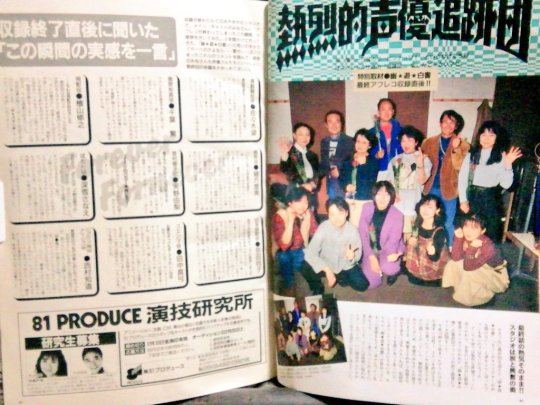
Voice Actors' Enthusiastic Chase Team
Special Coverage ● Yu ★ Yu ★ Hakusho
Immediately after the final dubbing recording!!
Source: Animage Magazine vol. 200 (January, 1995). Photos by @kurodenwa2

In the photograph:
From the left in the front row: Nobuyuki Hiyama (Hiei), Nozomu Sasaki (Yusuke Urameshi), Megumi Ogata (Kurama), Yuri Amano (Keiko Yukimura) and Yuri Shiratori (Yukina & Puu).
From the left in the back row: Sanae Miyuki (Botan), Tomomichi Nishimura (Jorge Saotome & narrator), Hisako Kyoda (older Genkai), Hidenari Ugaki (various roles: Okubo, Kirenja, Makintaro, Touou), Mayumi Tanaka (Koenma), Shigeru Chiba (Kazuma Kuwabara) and Ai Orikasa (Shizuru Kuwabara & Koto).
The heat of the final episode as it is!! The studio is a whirlpool of tears and excitement

The last episode of "Yu Yu Hakusho" aired on the 7th of this month (January, 1995). Many fans may have burst into tears, saying: "I can't listen to this character's voice anymore!"
Therefore, we became avid voice actor fans at AMs and paid a visited to the studio right after the final recording of "Yu Yu Hakusho", which took place at Shinjuku Sound Control Studio on the 23rd of last year.
The recording session started at 10:00 AM and was over after noon. The studio was filled with wine and sweets brought by the staff, it was exciting. The voice actors, including Mr. Sasaki, who played the role of Yusuke, were in a variety of moods. Some people were still so excited that they couldn't help but involuntarily shed tears, while others laughed or felt sad as they talked about the episodes recorded. Of course, there were also those who drank wine without realizing that "Yu Yu Hakusho" was over... At first glance, it may look like a disparate group, but there was this teamwork cultivated over time in the place, filled with a warm atmosphere oozing from people with good relationships.
"A word about the feeling of this moment" was heard immediately after the end of the recording

In the studio where the recording has just finished, we asked the main cast members their impressions about "this moment when the recording is over". A farewell to the characters and their thoughts on "Yu Yu Hakusho", which they have been working on for over two years...I hope the readers will read these comments filled with love and reflect upon the afterglow of the final episode along with the voice actors.
Yusuke Urameshi ● Nozomu Sasaki
"I may be here again next week"
......"It's over", I don't feel it at all. I just think "oh, it's over", because everyone else is saying that and making a fuss.
Will I be back here next week? (I won't, no (laughs)). I came every week without fail. If I have another chance, I would like to do a work that can be performed seriously like this. Without getting caught up in "Yusuke", right?
Everybody, thank you very much for your hard work for the past two years.
Kazuma Kuwabara ● Shigeru Chiba
"I was happy to meet the fans"
Yaaaaaah, jeeeeez, it was a loooot of fun... because I didn't have to "study for the role", I could just build it from the ground up. The teamwork's warm was great and I was happy to have had many opportunities to interact with the fans at the events. I felt that all the fans were enlivening this work. Besides, I was able to have fun with the fans not only as the spokesman of the character, but also as the individual "Shigeru Chiba". This kind of opportunity doesn’t come everyday.
Hiei ● Nobuyuki Hiyama
"I liked Hiei"
In the last episode, my turn ends before the interim commercial and the last line is: "Hmph, it's up to me". As an actor, it's obvious that you want to have lines, but as Hiei, it's cool to end like that. I always liked Hiei who kept his own pace all the time, but when Yukina got involved, he would react with a "shiver".
I believe that a work is completed only after the curtain comes down. Now, "Yu Yu Hakusho" has finally become a "work of art".
T/N: Hiei's last line (episode 112), approximately 40 seconds before the mid-commercial.

Kurama ● Megumi Ogata
"So many things have happened..."
Saaaad!...I don't know what's going on anymore. Kurama's last line was: "So many things have happened, I can't even remember them all", and that's exactly how I'm feeling right now. The time between post-production and on-air is like when you throw a ball and there's a while before it comes back. I might be able to get my head around it by the time the last episode goes on air, but right now, I don't really feel that "it's over". To be honest, that's the "current feeling"...
T/N: Kurama's last line on the stairs at Genkai's Temple.

Keiko Yukimura ● Yuri Amano
"Keiko-chan's happiness is my happiness"
Two years seems to be a short and long time.......But, I'm really glad that Keiko-chan was finally able to be happy in the end. Yusuke came back from the Demon World, that was reaaaally great!
Then, one last word......(*ahem*)
"REALLY, YOU'RE SUCH AN IDIOT, YUSUKE!"
Thank you to all the staff and fans who supported us.
T/N: I've always loved how Keiko screams: "Baakaaaa Yusuke".
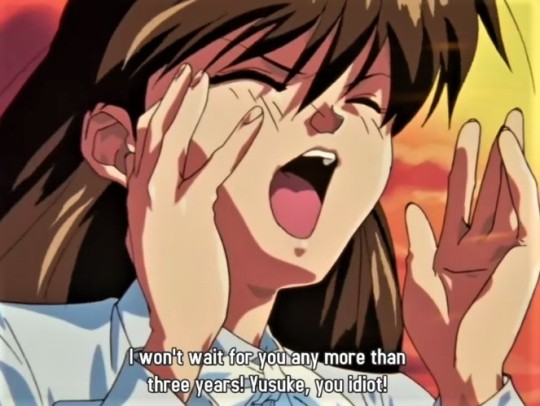
Botan ● Sanae Miyuki
I looove her! Botan is a "witty and stylish miss"
Yaaaah, it was good to play Botan. I could play an active role here and there and also make jokes (laughs).
The fact that "she's not human" was also a point. There is nothing sordid about her, she has a refreshing personality. But, this is what makes her so soft-hearted (laughs). She's just like an elegant and witty "miss" with an old-fashioned personality.
Anyway, I was blessed with two years of good work with my favorite character.
Master Genkai ● Hisako Kyōda
"I struggled with the gap between my own personality and hers"
Each one of the performers in this work was unique. It was a fortunate job. Master Genkai is always calm and plays a strict role, but I am actually a very scatterbrained person. That's why it was very difficult for me to give her a solemn feeling. I was consciously dropping my voice a few steps lower..... I have enjoyed working for the past two years. Thank you very much.
Koenma ● Mayumi Tanaka
"A work that makes me happy because there are many turns and gags"
Koenma is a character who doesn't appear too much in the original story, but in the anime, he appears a lot and I was happy to be able to have a lot of turns and do lots of gags. I was also happy that I was finally able to define Jorge's role, depicted in the script only as the "oni" (ogre), by continually calling him "Jorge" ad-lib.
I've made many mistakes in the past two years. I even broke my foot and also sprained it (lol). It's really hard to put into one word. A lot happened in those two years.
Jorge (oni)/Narrator ● Tomomichi Nishimura
"I had in mind to relax, but now I'm looking forward to it."
I took on this secret role as the "oni" as a way to relax, but it turned out to be a more active role than I had expected.
You couldn't tell that the narrator and Jorge were the same person, could you? fufufu. In the end, I was properly involved in the show and credited under the name of "Jorge", and tried to narrate the story as Jorge. I was also given the opportunity to disclose the secret.
Oh, it was a really interesting job.
T/N: Jorge reveals in Episode 111 that he was the narrator.
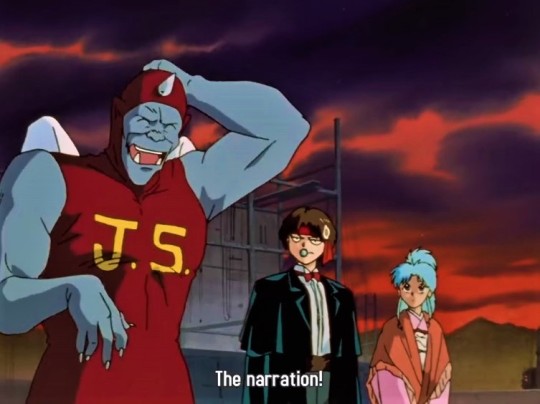
It's cool that Mayumi Tanaka (Koenma) was the one who named Jorge by calling him this way during the recordings. He was only known in the script as the "oni". Nishimura-san (Jorge) was also given the opportunity to tell the secret of the narrator at the end lol. I like how the voice actors contributed to the story by adding their own improvisation and interpretation. Let's not forget Togashi-sensei said in an interview that Shigeru Chiba understood the character Kuwabara better than him.
Source: Animage vol. 200, pp. 46-47 (1995). It's the February issue which is published in January.


There's also an interview with the main 4 and Yuri Amano (Keiko) in this magazine (pp.48-50). But, I'll translate it in another post.
Edit (it's translated): Part II (pp.48-50)
🇯🇵 日本語
熱烈的声優追跡団
特別取材●幽☆遊☆白書 最終アフレコ収録直後!!
最終話の熱気そのまま! !スタジオは涙と興奮の渦
今月7日に最終回を迎えた「幽★遊 ★白書」。「もうこのキャラクターの声を聞けない!」と涙をふりしぼったフ ァンも多いのではないだろうか。
そこでAMで熱烈な声優ファンに成りかわり、去年の゠月23日に新宿・ 整音スタジオで行われた「幽★遊★白 書」の最終回アフレコの終了直後にスタジオ訪問をした。
午前10時から始まったアフレコも正午過ぎには終了。スタジオ内はスタッフが持ち寄ったワインやお菓子ですっ かり盛り上がっていた。 幽助役の佐々木さんはじめ、声優のみなさんの様子はさまざま。興奮もさめやらぬ様子で思わず涙をこぼす人もいれば、収録中のエピソードを語り合って笑ったり、しんみりしたりする人たちもいる。 もちろん「幽★遊★白書」が終わってしまった実感をもてず、淡々とワインを 飲む人も.…。 一見バラバラのように 見えていても、そこには時間に培われ たチームワーク、いい関係の人たちか らにじみでる温かい空気に満ちていた。
収録終了直後に聞いた 「この瞬間の実感を一言」
収録が終わりたてのホヤホヤのスタジオで、メイン・キャストのみなさんに 「ア フレコが終わってしまったこの瞬間」 の感想をきいてみた。 2年間かけて作って きた、「幽★遊★白書」 への思いとキャラクターへのさよなら......愛がいっぱいつまったこれらのコメントを読んで、読者のみなさんも声優さんたちといっしょに、最終回の余韻をかみしめてほしい。
浦飯幽助役●佐々木望
僕は来週もここに来るかもしれない
......「 終わった 」 という実感が全然湧かない。みんながああやって、大騒ぎをしているから 「ああ、終わっちゃったんだ な」 って思うだけ。
来週もここに来ちゃうかな? (来ない、ない(笑) )。毎週、欠かさず来てたもんね。また機会があったら、こんな本気で演じられる仕事をしてみたい。「幽助」 にとらわれることな��、ね。
ほんとうにみなさん、2年間お疲れさでした。
桑原和真役●千葉繁
ファンとふれあえてうれしかった
いやー、もうー、楽しかったなーっー「役作り」をしないで、そのまま地でやれたからね。あったかいチームワークもすごく良かったし、イベントでファンの人とふれあえる機会が多かったのもうれしかった。 ファンの人、みんなが作品を盛上げてくれる感じがしてね。それにキャラクターの代弁者としてで なく、「千葉繁」 個人としてもファンといっしょに楽しめたことかな。そんな機会は滅多にないからね。
飛影役●槍山修之
そんな飛影が好きでした
最終回は中間コマーシャルの前で出番が終わるんですけど、最後のセリフが 「フン、オレの勝手だ」。役者としてはセリフが欲しいのはヤマヤマですけど、飛影としてはあれで路わるのがカッコイイ。常に、自分のペースをずっと保っているのに、雪菜が絡んでくると 「ピクッ」と反応する、そんな飛影が好きでした。
作品は幕が降りてはじめて完成するものだと思います。「幽★遊★白書」もこれでやっと「作品」になりました。
蔵馬役●緒方恵美
「いろんなことがありすぎて···」
悲し―っ!…もう何が何だが、よくわかんない。蔵馬の最後のセリフが 「いろんな事がありすぎて、 すべてが思い出せないくらいだな」なんですが、 今はまさにその心境。アフレコとオンエアの問って、ちょうど、 ボールを投げてもそれが戻ってくるまでにしばらく時間があるつて感じですよね。オンエアまでの間に気持ちの壁理がつくかも知れないけど、今はまだまだ全然「終わった」っていう実感がないのが、 正直なところ「今の実感」 です....。
雪村螢子役●天野由梨
螢子ちゃんの幸せは私の幸せです
2年間って短いような長いような......。でもとうとう最後に螢子ちゃんが幸せになれて、本当によかったと思います。
じゃあ最後に一言......(コホン)
「ユースケのバカアー本当にもう!」
スタッフのみなさん、それから応援してくれたファンのみなさん、ありがとうさいました。
ぼたん役●深雪さなえ
大好きーぼたんは 「小粋な姐さん」
いやぁ、「ぼたん」 役はいいでした。ここそというところで活躍できるし、ギャグもできるから (笑)。
「人間じゃない」 というところもポイントでしたね。ドロドロしたところがなくて、さっぱりしている。でもこれが情にもろいんだな (笑)。ちょうど昔かたぎの性格をしてる、小粋な 「姐さん��って感じでしょうか。
とにかく大好きなキャラクターと、いい仕事に恵まれた2年間でした。
幻海師範役●京田尚子
自分との性格のギャップに苦労しました
この作品は出演者のみなさんが、ともかくのひとりずつ個性的でしたね。幸しいお仕事でしたよ。幻海師範はいつも落ち着いていて、全体を締めていく役どころなんですけれども、私自身は本当はとてもオッチョコチョイな人なんですよ。だから彼女の重々しい感じを出すのは、実は大変なことだったんです。声も意識的に数段低く落としてやっていたんですけど…...。2年間、楽しいお仕事をさせて頂きました。ありがとうございました。
コエンマ役●田中真弓
出番もギャグも多くてうれしい作品
原作ではそんなに出てこないキャラクターなんですが、アニメでは出番も多く、ギャグもたくさんできてうれしかったですね。台本には「鬼」 としか描かれていない役をアドリブで 「ジョルジュー」 と 呼び倒し続け、ついに役として定義させるとができたのもうれしかったです。
この2年間いろいろ失敗もしました。この2年間いろいろ失敗もしました。足も折ったし、捻挫もしました (笑)。ほんとに一言では語れない。いろいろあった2年間でしたね。
ジョルジュ(鬼) 役 ナレーション役●西村知道
息抜きのつもりか楽しみになっちゃった
息抜きとして引き受けた秘役の鬼ですが、思っていたよりも活躍しましたね。
ナレーションとジョルジュ同じ人間がやっているなんて、わからなかったでしょ、ふふふ 。最後にはちゃんと番組の携わりに 「ジョルジュ」の名前でクレジットされたし、ジョルジュのままでナレーションをやってみたりして。
種あかしをする演出もしていただきましたし。ああ、本当におもしろい仕事でした。
出典: アニメージュ 1995年2月号
#yu yu hakusho#interview#animage magazine#Animage vol. 200 1995#interview with seiyuu#voice actors#yusuke urameshi#nozomu sasaki#shigeru chiba#kurama#megumi ogata#hiei#nobuyuki hiyama#koenma#mayumi tanaka#jorge saotome#Tomomichi Nishimura#genkai#Hisako Kyoda#Botan#Sanae Miyuki#Keiko Yukimura#Yuri Amano#shizuru kuwabara#Ai Orisaka#Yukina#Yuri Shiratori#Hidenari Ugaki#アニメージュ#seiyuu last words
57 notes
·
View notes
Photo
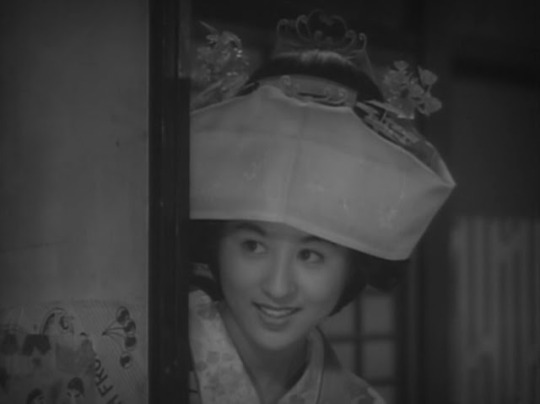
Kyoko Kagawa in Mother (Mikio Naruse, 1952)
Cast: Kinuyo Tanaka, Kyoko Kagawa, Eiji Okada, Masao Mishima, Akihiko Katayama, Keiko Enami, Daisuke Kato, Takashi Ito, Chieko Nakakita. Screenplay: Yoko Mizuki. Cinematography: Hiroshi Suzuki. Music: Ichiro Saito
Mutatis mutandis, Mikio Naruse's Mother could almost have been a 1950s Hollywood family drama starring Irene Dunne or Myrna Loy in the title role: a woman struggling to help her family survive difficult times. Of course, the necessary change would be that of setting: Mother is very much a portrait of lower middle class Japan in the immediate postwar years. Masako Fukuhara (Kinuyo Tanaka) is not just trying to feed her family but also struggling with the effects of the war, including disease -- the death of her only son from tuberculosis -- and crippling loss -- she and her husband, Ryosuke (Masao Mishima), take in her sister Noriko's little boy, Tetsuo (Takashi Ito), after Noriko (Chieko Nakakita) returns from Manchuria, where her husband was killed. Masako's struggle gets worse after Ryosuke works himself to death reestablishing the family's laundry business. Fortunately, there is Uncle Kimura (Daisuke Kato), who had been a prisoner of war in Russia, to help out in the laundry, but Masako still has to raise her teenage daughter, Toshiko (Kyoko Kagawa), as well as her younger daughter, Hisako, called Chako (Keiko Enami). What links Mother to the Hollywood films is some sentimental melodrama, a characteristic not usually ascribed to Naruse's work, and some rather conventional comic relief, such as the scene in which Toshiko's boyfriend, Shinjiro (Eiji Okada), sees her dressed as a bride and thinks she's marrying someone else, when in fact she's modeling for Noriko, who is trying to make it as a hair stylist. Fortunately, Naruse knows how to work against sentimentality and convention with some distancing tricks. In mid-film we are suddenly presented with a title card that says "The End" in Japanese -- a moment that actually made me reach for the remote to see if the screening service had somehow skipped to the end. It turns out to be the end title for a movie that Toshiko and her friends have gone to see -- a weepie that has left them in the tears guaranteed by its advertising. It also helps that Mother has the extraordinary Tanaka and Kagawa playing mother and daughter -- a relationship they would repeat in Kenji Mizoguchi's Sansho the Bailiff (1954). It's also interesting to see Okada as Shinjiro, one of his early performances, before he achieved international fame in Hiroshima Mon Amour (Alain Resnais, 1959) and Woman in the Dunes (Hiroshi Teshigahara, 1964).
3 notes
·
View notes
Photo

The Moon has Risen (Tsuki Wa Noborinu) - Kinuyo Tanaka (1955)
https://wfpp.columbia.edu/pioneer/kinuyo-tanaka/
#the moon has risen#tsuki wa noborinu#still#kinuyo tanaka#1955#1950s#thai drama#japan#yasujiro ozu#chishu ryu#hisako yamane#ryôsuke saitô#shigeyoshi mine#nikkatsu#romance
0 notes
Text
Yashahime Episode 41 Summary
Please do not repost this translation without my consent! This includes screenshots of any type and amount. If you wish to share this translation, simply link to this post.
For more information regarding the use of my translations, click here.
¡Por favor, no repostees esta traducción sin mi consentimiento! Esto incluye capturas de pantalla de cualquier tipo y cantidad. Si deseas compartir esta traducción, usa simplemente el enlace a este post.
Para más información sobre el uso de mis traducciones, haz click aquí.
Akuru’s Pinwheel
Short Summary
In the modern era, Kirin is the only person to sense that the Grim Comet draws near. In the feudal era, Towa’s soul has been used up from using the Zanseiken. Meanwhile, the Spirit of the Tree of Ages orders the Yashahime to destroy the descending Grim Comet in the Reiwa Era.
Expanded Summary
In the modern era, Kirin, who is the only person to sense that the Grim Comet draws near, laments over the destruction of mankind who of remain oblivious. In the feudal era, Towa’s soul has been used up from using the Zanseiken. This is because in exchange for the Zanseiken sucking out the demonic energy of Kirinmaru’s demon fireball which had been stealing Sesshomaru’s haku, the sword stole Towa’s soul itself. Akuru, who apparently can only be seen by the Dog General’s clan, approaches Towa, holds up his pinwheel and... Meanwhile, the Spirit of the Tree of Ages orders the Yashahime, whom Akuru has acknowledged, to destroy the descending Grim Comet in the Reiwa Era and eliminate the foreign body (translator’s note: foreign body = Kirin Osamu I think).
Cast List
Higurashi Towa: Matsumoto Sara
Setsuna: Komatsu Mikako
Moroha: Tadokoro Azusa
Inuyasha: Yamaguchi Kappei
Kagome: Yukino Satsuki
Jaken: Cho
Rin: Noto Mamiko
Tree of Ages: Hidaka Noriko
Takechiyo: Fairouz Ai
Shippo: Watanabe Kumiko
Kirinmaru: Hosoya Yoshimasa
Rion: Fujita Saki
Riku: Fukuyama Jun
Miroku: Yasumura Makoto
Sango: Kuwashima Houko
Kaede: Kyodo Hisako
Kohaku: Kimura Ryouhei
Hisui: Urao Takehiro
Ougigayatsu Hiraagi Danjou: Tanaka Masahiko
Princess Aiya: Yamaoka Yuri
Higurashi Mei: Terui Haruka
Others
56 notes
·
View notes
Photo

The Great Chase
26 notes
·
View notes